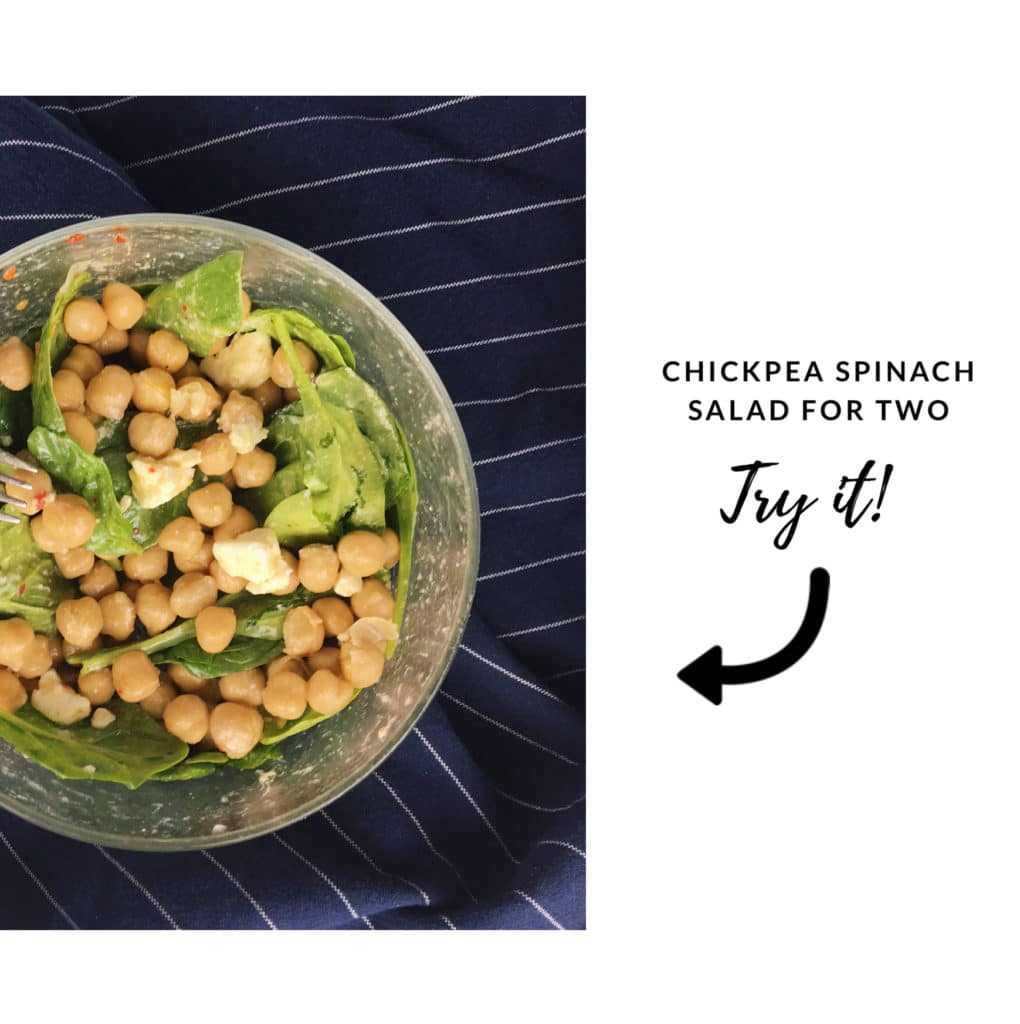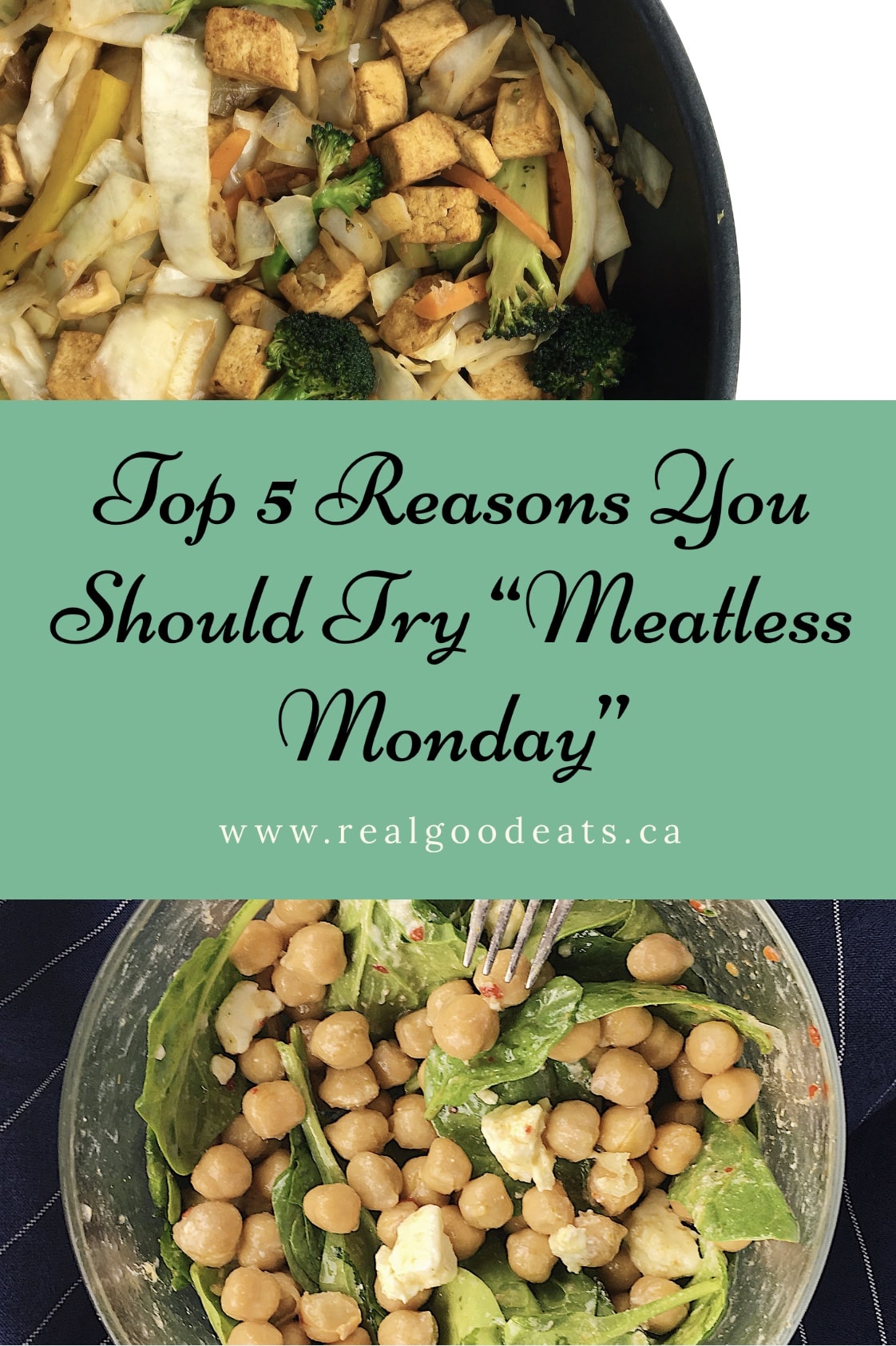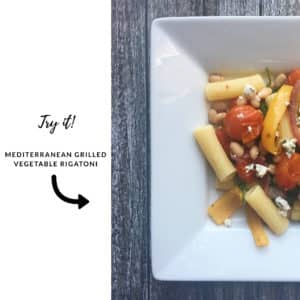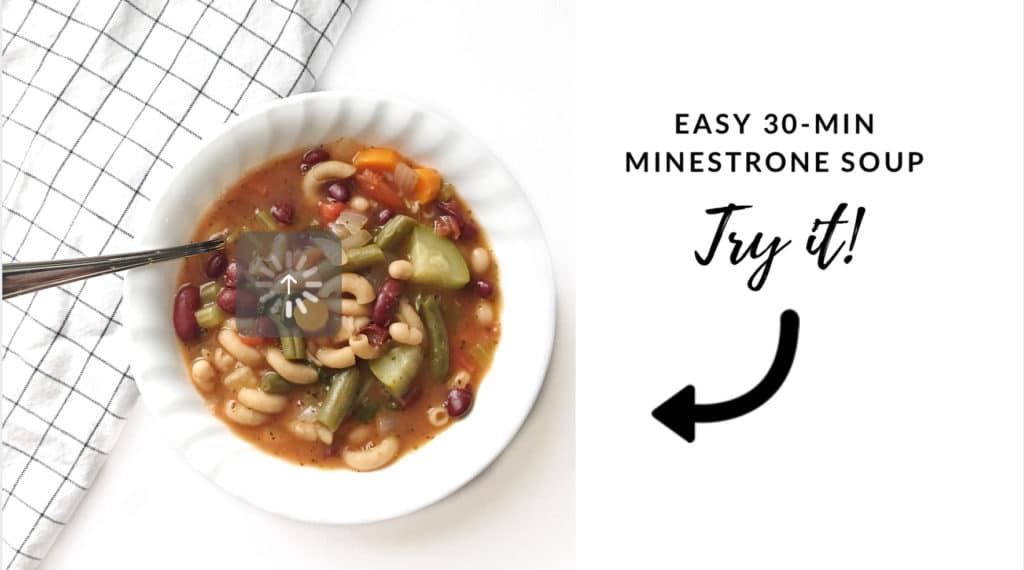Author: Hayley Harris, RD
Doctors, TV hosts, even your local grocery store mailer, all seem to be talking about Meatless Mondays. Most people have heard of this concept before, but few actually know what it is, and even fewer practice it. Of those who do, however, the attitude is the same: people love having a designated meat-free day of the week to help them stay healthy. Continue reading for the Top 5 Reasons you Should try Meatless Monday!
The history of meatless Monday…
Encouraging the population to refrain from eating meat at least one day per week was originally thought up during the First World War by Woodrow Wilson, in an effort to ration food. It wasn’t until 2003 that “Meatless Monday” became a health and wellness movement, first endorsed by the Johns Hopkins Bloomberg School of Public Health. Today, this movement has gained support from school districts, hospitals, restaurants, and celebrities across the world. There’s even a “Meatless Monday” where you can receive a free toolkit, get recipe inspiration, and learn how Meatless Monday is being practiced in 44 different countries around the world!
Why we love it…
Pledging to go vegetarian just one day a week is a more realistic and attainable way to help you cut back on meat without the restriction of a full vegetarian diet. While there are many benefits of eating a plant-based diet, the Meatless Monday movement promotes the fact that you don’t have to do a complete diet overhaul to begin reaping the benefits.
In fact, according to the 2016 Canadian Cardiovascular guidelines, just 4 servings per week of legumes (think: nuts, beans, and lentils) can help reduce your risk of cardiovascular disease! If cooking with plant-based protein is new for you, Meatless Monday can be a great way to lead to sustained behaviour change too. Small changes (even just starting with a meat free dinner once a week) can make a difference and can gradually build into the acceptance and enjoyment of meat-free meals by yourself and everyone at the table.
Meatless Mondays are rising in popularity as the numerous benefits are being realized. Going meat-free just one day a week isn’t just good for your health, it’s better for the environment, your busy schedule, and your wallet! Read on to find out why you might want to jump on the bandwagon and go meat-free next Monday!
1. Sustainability
Perhaps one of the most well-researched benefits of cutting back on meat consumption is the sparing of earth’s resources. In fact, practicing “Meatless Mondays” has been said to be one of the best things individuals can do to help reduce our impact on the environment. Here’s why: the production of livestock for food (which includes beef, pork, and poultry) requires high amounts of fuel, water, and land. The Food and Agriculture Organization of the United Nations (FAO) estimates that 14.5 percent of all greenhouse gas emissions are due to livestock production, which happens to be more than that emitted worldwide for transportation.

Raising livestock also requires large amounts of water and has polluted many delicate water systems. In addition to the land required for grazing, which happens to be a big contributor to deforestation, extra land is required to grow feed for these animals. It takes an average of seven pounds of animal feed to produce a single pound of beef. Pork requires about three pounds while chicken requires about two. Feed crop production uses up to a third of the world’s farmable land, which could be used to grow more crops for humans instead. Reducing your meat consumption by just 15% (or 1 out of every seven days as advocated for by Meatless Mondays) can help make a difference in the amount of land, water, and fuel we use and decrease our negative impact on the environment (2-5).
2. Superior Nutrition
It’s no secret that North America is overwhelmed by chronic disease, including heart disease, type 2 diabetes, obesity, and cancer. Increased consumption of animal products, specifically red and processed meat, is associated with a higher risk for cardiovascular disease, diabetes, as well as certain cancers. The good news? Replacing meat with plant-based protein has a beneficial effect on several risk factors for these diseases, including blood pressure and cholesterol levels. Here’s how: by swapping animal for plant protein, you’re adding beneficial nutrients that typically aren’t found in meat; namely: antioxidants, and important vitamins like folate, magnesium, and potassium. These nutrients are important for overall health, healthy reproduction, fighting off disease, and just generally feeling your best.
Most plant-based proteins are also great sources of fibre, which promotes a healthy digestive system and a healthier blood sugar response after eating. Fibre also protects your heart by binding and excreting unwanted compounds, helping reduce your risk of heart disease. In addition to fibre, swapping out animal protein means you’re making more room on your plate for healthy, unsaturated fats from plant sources such as nuts, seeds, vegetable oil, and avocado. Worried about getting enough protein in your meals without meat? Don’t be. You can still get plenty of protein from plants such as soy, lentils, beans, nuts and seeds, such as hemp seeds, sesame seeds, and chia (6-11).
3. Cheaper Now and Later
Perhaps the most compelling argument for a meatless meal is the amount of money you’ll save on groceries each week! Lean cuts of meat, poultry, and fish are some of the most expensive items in the grocery store. By eliminating these more “spendy” items from your menu for one day a week, you can actually save a lot of money each month! If you skip the steak one night and opt for Lentil Tacos instead, you can save around $20 dollars for a family of four. Do that for a year and you’ve saved yourself over a thousand dollars! That’s a lot of money that can then be put towards buying fresh fruits and vegetables instead.
Legumes like beans and lentils are cheap, heart healthy, and still a great source of protein which will keep you full. Loading your plate with other inexpensive, filling foods like healthy whole grains, baked potatoes, and fibrous vegetables will ensure that you don’t even miss the meat. For other delicious, inexpensive meat-free meals, try a Quick and Easy Naan Bread Pizza, Lentil and Goat Cheese Casserole, Easy Spinach and Lentil Soup, or One Pan Mexican Quinoa.
Cheap doesn’t have to mean boring, and meatless doesn’t have to be unsatisfying. Furthermore, The Meatless Mondays initiative can save you money down the road. If you are able to increase your consumption of healthy meat-free recipes, you might be able to avoid some of the chronic diseases stated above, saving you money in medical bills and expensive prescriptions. These habits can spread throughout the family and impact their health over their lifetime.
4. Consider the Convenience
If you’ve ever ruined a roast, or tried to salvage a tough steak or a dry turkey, you know the struggle of preparing meat. Between tenderizing, marinating, basting, and braising, there really is a lot to know, and all lot that can go wrong. Aside from being complicated, meat tends to be the most time consuming portion of the meal. Worrying about thawing, marinating, and then perfectly cooking a cut of meat can take hours, going without the meat will save you the headache!
Popular meat replacements like canned beans, frozen edamame, and tofu are ready-to-eat, they just need to be heated through and seasoned. Try this Quick and Easy Vegetarian Salad, a Dairy-Free Hummus Quesadilla, Tofu Tostadas, or a Chickpea Spinach Salad for a balanced meal ready in under 20 minutes! Dry lentils can be boiled in different stocks or sauces to impart different flavors and for another quick and easy protein source.
Once cooked, they can be added to soups, salads, rice or pasta dishes. Perhaps the easiest meat-less meal of all is to make breakfast for dinner. Whole grain waffles topped with nut butters and fruit, omelettes and hash browns, or crepes stuffed with Greek yogurt, nothing is more convenient than quick breakfast food!
5. Break Out of Your Routine
Going Meatless once a week might sound easy until week three hits and you’ve already made all of the vegetarian recipes you know. This is actually a good thing because it forces you to branch out of the regular dinners you fall back on and try new things. Trying new recipes can be both fun, exciting, and beneficial to your health. Eating a variety of beans, vegetables, fruits, whole grains, nuts and seeds ensures you are getting a wide range of nutrients, especially if they are ingredients you rarely use other days of the week. You might be surprised how much you enjoy recipes that rely on different ingredients other than meat to flavour your dishes.
Many cultures and cuisines around the world use meat more sparingly than we do in North America, and trying a new cuisine might be a great inspiration for new recipes you want to make! Asian and Middle Eastern cultures have many dishes that are flavoured beautifully with spices and savoury sauces so they don’t miss the flavour of meat. These dishes also use a lot of legumes, nuts, soy, and whole grains so you still feel full after the meal.
Try a mild curry, falafel, edamame stir fry, or a Thai soup for starters. If you are looking for something more basic, many Latin cultures rely on the combination of rice and beans. Try this dynamic duo with different sides such as a spicy salsa, Brazilian vinaigrette, or even some spicy roasted broccoli. Shaking things up with a new recipe each week also helps Meatless Monday become something you and you’ll look forward to as it keeps the taste-buds engaged. No more boring meals you have eaten over and over again. As you explore, you’ll find recipes that become your new favourites, and might learn some new cooking skills as well.
Need some inspo? Check out our favourite quick and easy vegetarian recipes here.
Give it a try!
Going meat-free one day a week can be fun and motivating for yourself and with your family, and is beneficial in so many ways. There’s no better start to the week than participating in something that will promote healthy behaviours throughout the rest of the week.
Not only will this initiative improve your health, but it will help you feel like you are doing something worthwhile to improve our environment, save your family money, break you out of a food rut, and cut down on food-preparation time so you can spend more time together, doing the things you love. Jump on the bandwagon and start experiencing these, and other benefits when you go meat-free this Monday!
Sources:
- http://www.meatlessmonday.com/about-us/
- “The Impacts – 2011 Meat Eater’s Guide to Climate Change + Health”. Environmental Working Group. 2011. Archived from the original on 2018-05-20.
- Gerber PJ, Steinfeld H, Henderson B, et al. Tackling Climate Change through Livestock – A Global Assessment of Emissions and Mitigation Opportunities. Rome: Food and Agriculture Organization of the United Nations; 2013.
- Adler, Jerry; Lawler, Andrew (June 2012). “How the Chicken Conquered the World”. Smithsonian. Retrieved April 19, 2015.
- “Cattle ranching is encroaching on forests in Latin America”. Fao.org. 2005-06-08. Retrieved 2015-03-30.
- 1 WHO. Health Statistics and Information Systems, Cause-Specific Mortality Global Summary Estimates, Estimates for 2010-2012; http://www.who.int/healthinfo/ global_burden_disease/estimates/en/index1.html; Accessed June 24, 2016.
- Hartley L, Igbinedion E, Flowers N, Thorogood M, Clarke A et al. Increased consumption of fruit and vegetables for the primary prevention of cardiovascular diseases. Cochrane Database of Systematic Reviews. 2013; 6:CD009874.
- Boeing H, Bechthold A, Bub A, Ellinger S, Haller D, Kroke A et al. Critical review: vegetables and fruit in the prevention of chronic diseases. European Journal of Nutrition. 2012; 51(6):637-63
- Pan A, Sun Q, Bernstein AM, Manson JE, Willett WC, Hu FB. Changes in Red Meat Consumption and Subsequent Risk of Type 2 Diabetes Mellitus: Three Cohorts of US Men and Women. JAMA Intern Med. 2013;173(14):1328-1335. doi:10.1001/jamainternmed.2013.6633.
- Bouvard, Véronique et al. Carcinogenicity of consumption of red and processed meat. The Lancet Oncology. 2015; 16(16):1599 – 1600.
- Tuso, Philip J; et al. (2013). “Nutritional Update for Physicians: Plant-Based Diets”. The Permanente Journal (17.2): 61–66.
Don’t miss a thing! Subscribe to receive the latest recipes and healthy eating tips straight to your inbox! ?
[yikes-mailchimp form=”2″]
About Hayley
Hayley is a Registered Dietitian Nutritionist, a part-time yoga teacher, and full-time mother. She has always been passionate about health and empowering others to make healthy living a little easier. She has worked as a health coach, fitness instructor, nutrition writer, and recipe developer. She is passionate about delicious food and making “healthy” taste good. She loves trying new recipes, eating Thai food, paddle-board yoga, and hiking in her home state of Montana. She hopes to inspire others to eat closely to the way that nature intended, capitalizing on the amazing benefits of whole, unprocessed foods. Follow her posts on @hayleyharrisnutrition for nutrition advice and delicious recipes!




